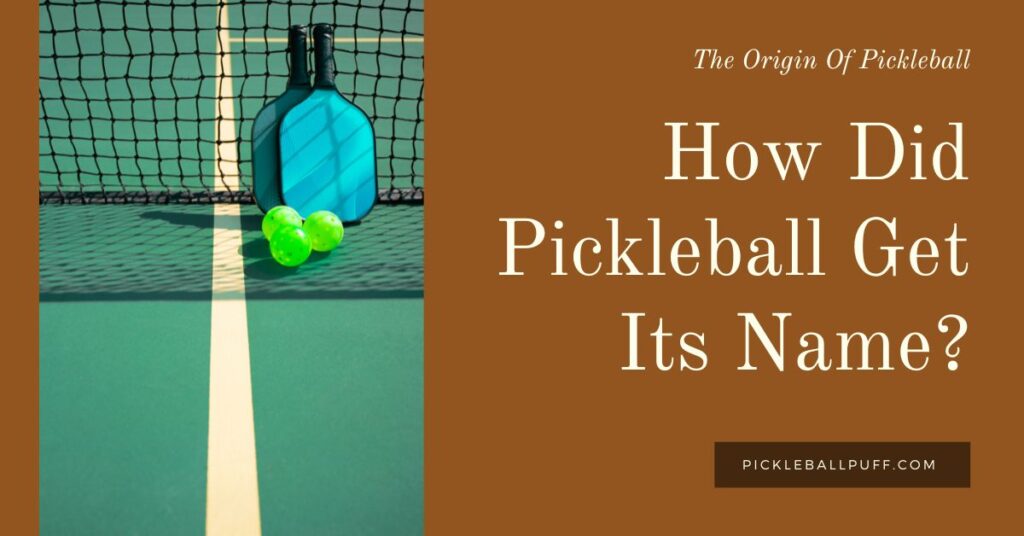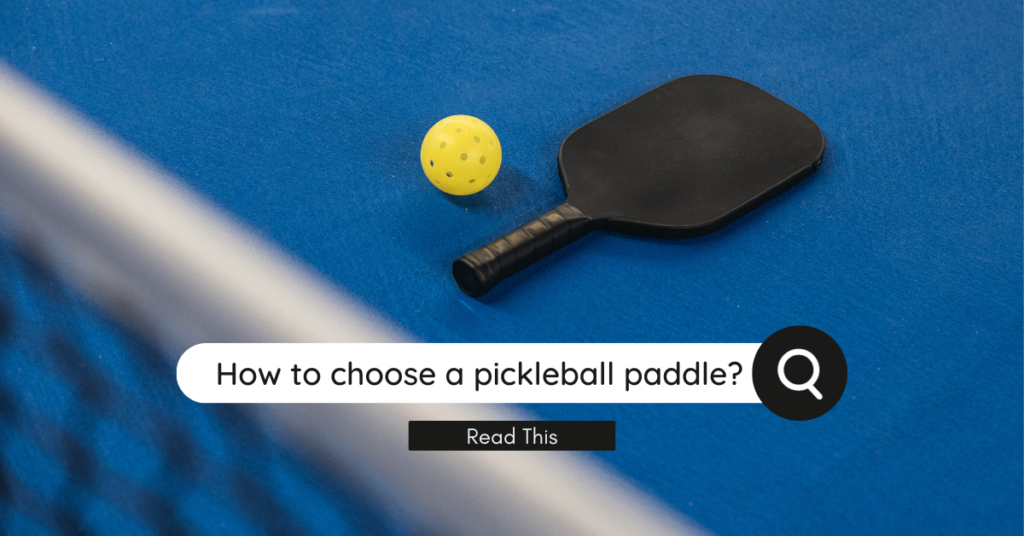Just think this: a curious blend of tennis, ping pong, and badminton, and voila! You’ve got pickleball. But hold on – how on earth did it end up with a name that sounds more like a family pet than a sport? It’s a quirky story that involves a few friends, a dog named Pickles, and a whole lot of fun. Join us on a lighthearted journey into the origin of pickleball’s name, and discover the whimsical tale that adds a sprinkle of charm to this beloved game.
Surprisingly, the origins of the name trace back to a family pet named Pickles. In the 1960s, Joel Pritchard and Bill Bell, seeking a fun and engaging activity for their families, improvised a game using various sports equipment in their backyard.
Pickleball got its name from the family dog who was called “Pickles” and would chase after the ball during the game. In the mid-1960s, Pickles’ owners, Joel Pritchard, a congressman, and Bill Bell, a successful businessman, created the game as a form of entertainment for their families, and they named it after their dog.
As their dog, Pickles, eagerly retrieved the ball during play, the game earned its name. Since then, Pickleball has gained widespread popularity due to its accessibility and entertainment value. We will delve deeper into the fascinating backstory of how Pickleball acquired its peculiar name and explore the evolution of the sport over the years.

Credit: www.sru.edu
The Origin Of Pickleball
Pickleball may be one of the fastest-growing sports in America today, but have you ever wondered how it got its unique name? The story behind the origin of pickleball is quite fascinating and involves a combination of sports and even a family dog named Pickles. Let’s delve into the intriguing history of how pickleball got its name.
A Combination Of Sports
The creation of pickleball was an ingenious merger of different sports, resulting in a truly unique game. In the summer of 1965, Joel Pritchard, a congressman from Washington State, and his friend, Bill Bell, found themselves in need of a game to entertain their families during the summer holidays.
They started by modifying the rules of badminton, using a net lowered to about 36 inches above the ground. They then borrowed a whiffle ball from their children and, using some handmade wooden paddles, began playing on their backyard court. Soon enough, their families joined in on the fun, and a new sport was born.
The game quickly gained popularity among their friends and neighbors, who were intrigued by this unique combination of tennis, badminton, and ping pong. As the sport continued to evolve, its founders realized that it needed a name that captured its essence.
A Family Dog Named Pickles
Legend has it that the official name of the sport, ‘pickleball,’ was inspired by the Pritchard family’s beloved dog, Pickles. Pickles was a mischievous and energetic cocker spaniel who often chased after the balls during the games, even swatting them back with his paws.
Whenever a wayward shot found its way into the bushes, someone would shout, “Pick up that Pickleball, Pickles!” The name stuck, and soon everyone was referring to the game as pickleball.
Although the origins of this anecdote are mostly anecdotal, it adds a charming and memorable touch to the sport’s history.
Today, pickleball has grown into a sport enjoyed by millions of people around the world. Its unique name and captivating backstory have undoubtedly contributed to its popularity and intrigue. Whether you’re a seasoned player or new to the game, knowing the origin of pickleball adds an extra layer of appreciation for this fun and exciting sport.
The Unveiling Of The Quirky Moniker
When it comes to the history of sports, some stories are more peculiar than others. In the case of pickleball, its origin story includes a dog, a couple of friends, and a quirky moniker. In this post, we’ll delve into how pickleball got its name, focusing specifically on the unveiling of the unique and intriguing label that has come to define this popular sport.
A Dog’s Legacy
It all started back in the summer of 1965 on Bainbridge Island, Washington. Joel Pritchard, a congressman, and Barney McCallum, a successful businessman, found themselves looking for a way to entertain their families on a lazy Saturday afternoon. They attempted to set up a game of badminton, but couldn’t find the shuttlecock. Undeterred, they improvised, using a whiffle ball instead and lowering the badminton net to accommodate their young children.
Before long, their creation caught the attention of a canine spectator, Pritchard’s cocker spaniel named Pickles. Curious and full of energy, Pickles would chase after errant balls and race across the court, adding an unexpected element of entertainment to the game. It was this lively dog that unknowingly played a role in the naming of the future sport.
Joel Pritchard And Barney Mccallum
Realizing they were on to something special, Pritchard and McCallum decided to refine their creation, giving it proper rules and equipment. They enlisted the help of another friend, Bill Bell, who helped design specific paddles for the game. As the sport evolved, it became clear that it needed a name that would embody its playful nature and unique origins.
After much contemplation, the trio decided to pay homage to Pritchard’s beloved pup and named the sport “pickleball.” It was a combination of Pickles, the energetic and spirited dog who brought joy and laughter to their initial games, and the term “pickle boat,” which refers to a boat that is the last to finish a race, symbolizing the lighthearted and friendly competitive nature of the game.
With a name in place, the sport of pickleball went on to captivate players of all ages and backgrounds. Its popularity spread from local communities to national competitions and eventually internationally, where it continues to bring people together and showcase the joy of friendly competition.
The Evolution And Popularity Of Pickleball
The name “pickleball” has an interesting origin. It was named after a family dog named “Pickles” who used to chase the ball during the early days of the game’s development, and thus the name stuck. The sport has since gained immense popularity worldwide, attracting players of all ages and skill levels.
Pickleball Association Formation
The formation of Pickleball Association played a significant role in the evolution and popularity of this sport. In the mid-1960s, Pickleball was still in its infancy, primarily played by families and friends in the backyards. It wasn’t until 1967 that the first Pickleball Association was formed, spearheaded by Joel Pritchard, Barney McCallum, and Bill Bell.
This association paved the way for Pickleball to become more organized and structured. By establishing rules, regulations, and equipment standards, the association ensured consistency and fair play across different courts and players. This initial step allowed the sport to flourish and gain recognition beyond just a casual backyard activity.
It provided a platform for players to gather, compete, and share their passion for the game. With a dedicated association in place, Pickleball soon burst onto the scene, attracting a growing number of enthusiastic participants.
Modern-day Pickleball Craze
In recent years, Pickleball has experienced an unprecedented surge in popularity. What was once a niche sport primarily enjoyed by older adults has now evolved into a widely recognized and highly competitive game that appeals to people of all ages. The rise of this modern-day Pickleball craze can be attributed to several key factors.
Firstly, the sport’s accessibility and adaptability have played a significant role in its growing appeal. With smaller courts than traditional tennis, a slower pace, and a lightweight paddle, Pickleball is not only easy to learn but also gentle on the joints. As a result, it has become a go-to activity for many looking to stay active, both young and old.
Moreover, Pickleball is a highly social sport, fostering a sense of community and camaraderie among its players. The game’s format encourages doubles play, allowing friends and family to team up while new connections are formed on the court. The collaborative nature of Pickleball not only enhances the overall experience but also promotes a welcoming environment for new players.
Lastly, the sport’s proactive marketing efforts have undoubtedly contributed to its newfound popularity. Pickleball associations, manufacturers, and avid players have taken advantage of various digital platforms to spread the word about the sport.
Social media campaigns, instructional videos, and tournament highlights have all helped to generate interest and attract newcomers to the game. The rapid rise in Pickleball’s popularity is evident in the increasing number of players, tournaments, and dedicated facilities popping up across the globe.
With its blend of athleticism, strategy, and social interaction, it’s no wonder why Pickleball has become a favorite pastime for so many. As the sport continues to evolve and gain momentum, it’s safe to say that the excitement surrounding Pickleball shows no signs of slowing down anytime soon.

Credit: www.amazon.com
Frequently Asked Questions On How Did Pickleball Get Its Name
Why Is Pickleball Called That?
Pickleball got its name from the family dog, Pickles. The game was invented by three dads in 1965 and they named it after their dog who loved to chase after the balls.
What Does Pickle Mean In Pickleball?
Pickle in pickleball refers to being stuck in a point where you cannot effectively smash or volley the ball.
How Did The Name Pickleball Originate From This Family Pet?
The name pickleball originated from the family pet, a cocker spaniel named Pickles, who would chase after the balls.
Who Were The Two Men Who Created Pickleball?
Joel Pritchard and Bill Bell are the two men credited with creating pickleball.
How Did Pickleball Get Its Name?
Pickleball got its name when a family dog named Pickles started chasing the ball during the game.
Conclusion
So there you have it, the intriguing story behind how pickleball got its name. Whether it was named after the inventor’s dog or derived from the game’s unique origins, one thing’s for sure – pickleball has come a long way since its humble beginnings.
Now a popular sport enjoyed by millions worldwide, this fascinating mix of tennis, badminton, and ping pong continues to grow in popularity. So grab your paddle and get ready to pickleball!



